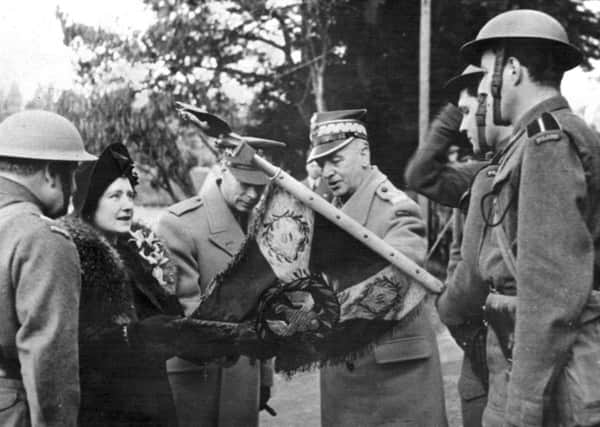The bond between the Scottish Lion and Polish Eagle


Many of our best troops had been killed or fell into captivity as prisoners of war, leaving our defences weakened and stretched.
However, we were not entirely on our own. Large numbers of Polish soldiers had escaped from mainland Europe and it was decided that they would be responsible for the defence of the east coast of Scotland.
Advertisement
Hide AdAdvertisement
Hide AdA highlight for the troops, based at Dalkeith Palace, came in March 1941, when His Majesty King George VI and Queen Elizabeth along with the Polish Commander in Chief General Sikorski, visited them and presented new colours to the 10th Polish Mounted Rifle Regiment.
They soon became a very familiar site around the highways and byways of Midlothian, whether on route marches or in their armoured vehicles buzzing around the farmland and woods. They were also well-known around the pubs of Dalkeith, and it’s fair to say they liked a good drink now and again.
So picture this, it's a Thursday night in Dalkeith and a young Polish soldier, 29-year-old L/Cpl Stanislaw Robel, gets himself arrested by the police for a breach of the peace at the chip shop in the High Street, and off he goes, slightly the worst for wear, to Dalkeith Police Station to appear in court in the morning.
No big deal really, these things happen, at least that is until Pte Jan Palaszweski (21) turns up an hour later in a very intoxicated state with his Sten machine gun on him, demanding the police release his mate from custody. Understandably the Dalkeith Polis were not impressed and wouldn't let him into the station.
Advertisement
Hide AdAdvertisement
Hide AdNervously they watched until at one point he puts his weapon down whilst remonstrating. Seizing their chance, the police pounce on him and he was arrested. It turns out he had no ammunition for the weapon, but would you fancy facing up to a hot-headed drunk soldier with a sub machine gun? In court he says he is sorry, and states he had no intention of using the weapon but merely felt annoyed his comrade had been arrested.
The Justice of the Peace was no less than Provost Lean who "took a very dim view of the matter" and decided to fine Robel £1 after he admitted the charge and Palaszweski was fined £3 or 20 days in the jail. He was given 14 days to pay. He was probably saved from a stiffer sentence as it was March 1944 and every man was needed in preparation for the invasion of Europe.
Deer Park and parts of Newbattle Golf Course were used for the training of drivers of Universal Carriers, or Bren Carriers as everybody knew them – a small open topped tracked vehicle, carrying a few Infantry men and their kit.
One of the instructors was Pte Zibigniew Kozlowski (24). March 1944 he is putting rookie drivers through their paces in readiness for D Day when tragedy strikes. The driver runs off the edge of the track and overturns the vehicle. Pte Kozlowski is pinned by the vehicle as it rolls over and is killed when his back is broken. He was buried with full military honours in Costorphine Hill Cemetery in Edinburgh.
Advertisement
Hide AdAdvertisement
Hide AdThe Polish troops were welcomed into the community and formed strong bonds with the locals. A good number of the men began dating local girls and many romances blossomed. However, in 1944 this came to an abrupt end. The Poles said their tearful farewells to their adopted home and headed south to take part in the invasion of Europe. They fought with great courage and distinction. Some would not return.
With the surrender of Germany in May 1945 a new foe emerged for the Poles. They found to their disgust that Poland had became a puppet Communist state under the control of the Soviet Union. Many had much to fear from the Soviets, and if they returned to Poland certain death awaited them. So began a period of exile and life in Displaced Persons Camps. Struggling to make a new life for themselves, cut off from their family and friends in their homeland, and now unwanted by the British Government that had welcomed then just five short years before.
Gradually, however, they found their feet, getting jobs, mainly in the local pits and marrying their local sweethearts. I remember growing up in Newtongrange in the 60s, the numerous Polish surnames of my classmates, and Polish accents still evident in the village.
For most Polish soldiers Scotland was like a second home, but for many it became their adopted home and remains so until this day.